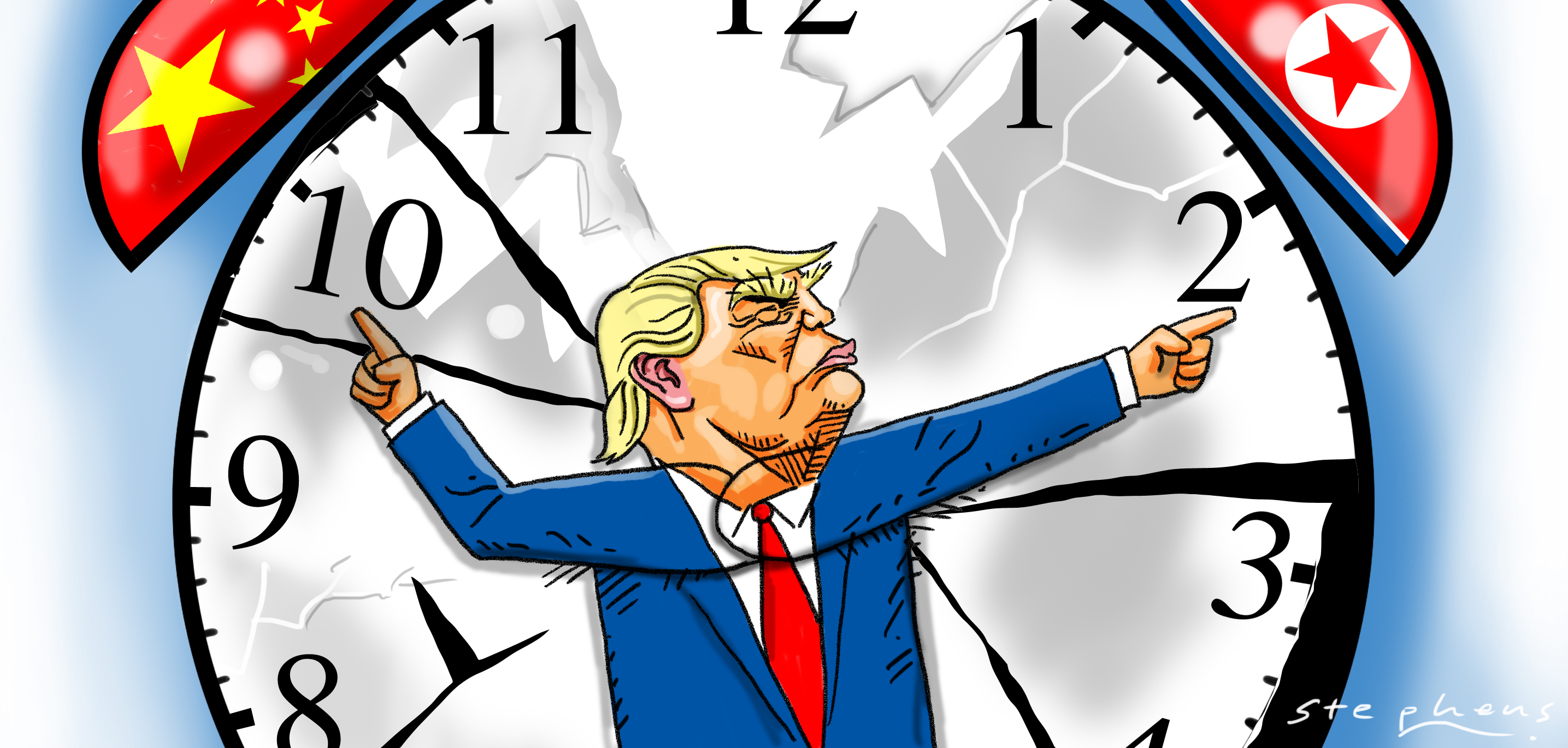COLUMNIST TOM PLATE WRITES — There is a famously funny but technically accurate saying to the effect that even a broken clock is right twice a day. For some reason – don’t know why … – this adage comes to mind in looking at Donald J. Trump’s emerging foreign policy.
Consider the U.S. president’s efforts to engage with President Xi Jinping of the People’s Republic of China and with supreme leader Kim Jong Un of the Democratic People’s Republic of Korea. They are not unfolding according to normal practice. So protocol purists are in a dither. International theorists are in highest dudgeon. The anti-Trump U.S. media (which is most of it) is heaping scorn.
In the case of Mr Xi and his China, the complaint is not over a paucity of ‘leader of China/leader of America’ communication but a plethora. Some reporters joke that Mr Trump phones Mr Xi almost as often as First Lady Melania. Ordinarily, personal diplomacy is applauded but, collectively, our media commentariat and talk-show hosts are so negative on Trump, if famous Cold War strategist George Kennan rose from the dead and offered a good word for the new president for personal engagement, the media would probably paint this as a Russian trick or the like.
One U.S. media story suggested, with thin sourcing, that Mr Xi was feeling “pestered” by Mr Trump’s near-constant phoning and hardly knows what to do with his new, clueless pal. But is this credible? China’s hard-working president is obviously no slacker but he’d have to be just that to feel ‘pestered’ by calls from the president of the United States. On the contrary, it’s a feather in Xi’s Mao cap. It’s not exactly as if he’s being “pestered” by some minister from the Maldives. In the China-U.S. relations, continuing communication is vital. Less is not more.
Perhaps the fraught issue of the Korean Peninsula ‘crisis’ helps accounts for hotline upsurge. Trump, clearly agitated by the Pyongyang bee in his bonnet, has declaimed that the ‘crisis’ will be solved by the U.S. alone, if Beijing decides not to pitch in. Nobody anywhere seems to know what this might mean. But it cannot be good: for starters, a U.S. Navy carrier group is bobbing near the Korean Peninsula; the head of the U.S. Central Intelligence Agency has been visiting Seoul; and a THAAD ‘defensive’ missile system is now on South Korean soil. The fact is that most South Koreans don’t want the thing and the Chinese hate the thing – it’s an obnoxiously offensive intrusion into their neighborhood. Mr Trump doesn’t seem to care.
Then there is worry over the ideological objectivity of Mr Xi’s tutoring of Mr. Trump on issues Asia during their trans-Pacific chats. But I don’t see a downside here: Who would we prefer as tutor, Kim Jong Un? Don’t be too quick to laugh! Consider that the president, defying protocol yet again with an off-the-cuff invitation to North Korea’s leader to visit with him in the U.S., declared he’d be “honored” to meet with the young Kim, whom he has curiously (or even accurately, who knows?) described as a “pretty smart cookie.”
For these procedural and diplomatic apostasies, the U.S. news media jumps all over Mr Trump. I’m not sure this is right. Should invitations be reserved only for leaders with whom the U.S. has no tense issues? Talking mainly to those with whom you agree is of course one way to limit contradiction; but it can also be a boring time-waster. On this one, we side with our nonplused ‘leader of the free world’.
The instinct to meet with Kim accords with all we know of the North Korean mentality. Its extremely centralized government responds only to big time, top level engagement. In 1994, on the edge of a serious nuclear blowup, former President Jimmy Carter lands in Pyongyang and saves the day. In 2009 former President Bill Clinton lands in Pyongyang and secures the pardon and release of two young American journalists who’d been imprisoned for something or other.
Ask yourself what the Six Party Talks accomplished? Next to nothing. Why? They were not at the highest possible level. With the DPRK, nothing happens of consequence at any level lower than the highest. Mr Trump’s proposal to meet with Supreme Leader Kim – for all the American foreign-policy establishment’s tut-tut-ing – is worth a shot. Alas, with Pyongyang of late claiming to have foiled a CIA plot to assassinate the supreme leader, Kim perhaps doubts America will necessarily honor the return visa back to Pyongyang.
That said, the notion that our wildly unprepared American president cannot ever be right even if he were but a broken clock is pervasive in our media. In an absolutely superb essay in the current ‘London Review of Books’, American historian Jackson Lears, editor of Raritan Quarterly Review, echoes this: “Consider the recent outcry over Donald Trump’s suggestion that, while Vladimir Putin may be a ‘killer’, “there are a lot of killers .… What do you think? [he said in a TV interview] … our country’s so innocent?” Of this, Professor Lears comments: “Defenders of conventional wisdom were livid at any hint that the ‘indispensible nation’ might be as imperfect as any other.”
The good news about Trump (and I agree, a lot of it there is not) is that he is an out-of-the box thinker, though, it is admitted, this may be because he doesn’t know where the boxes are in order to realize that he’s outside them. And maybe if his clock were ticking normally he’d never get anything right. Who knows? But twice a day is better than nothing, especially when the right ticks happen to concern the future of Asia and America.
Columnist and Professor Tom Plate, Asia Media International founder and Loyola Marymount University’s Distinguished Scholar of Asian and Pacific Studies, is author of the ‘Giants of Asia’ quartet. His next book ‘Yo-Yo Diplomacy’ on China and the U.S. is due later this year.

